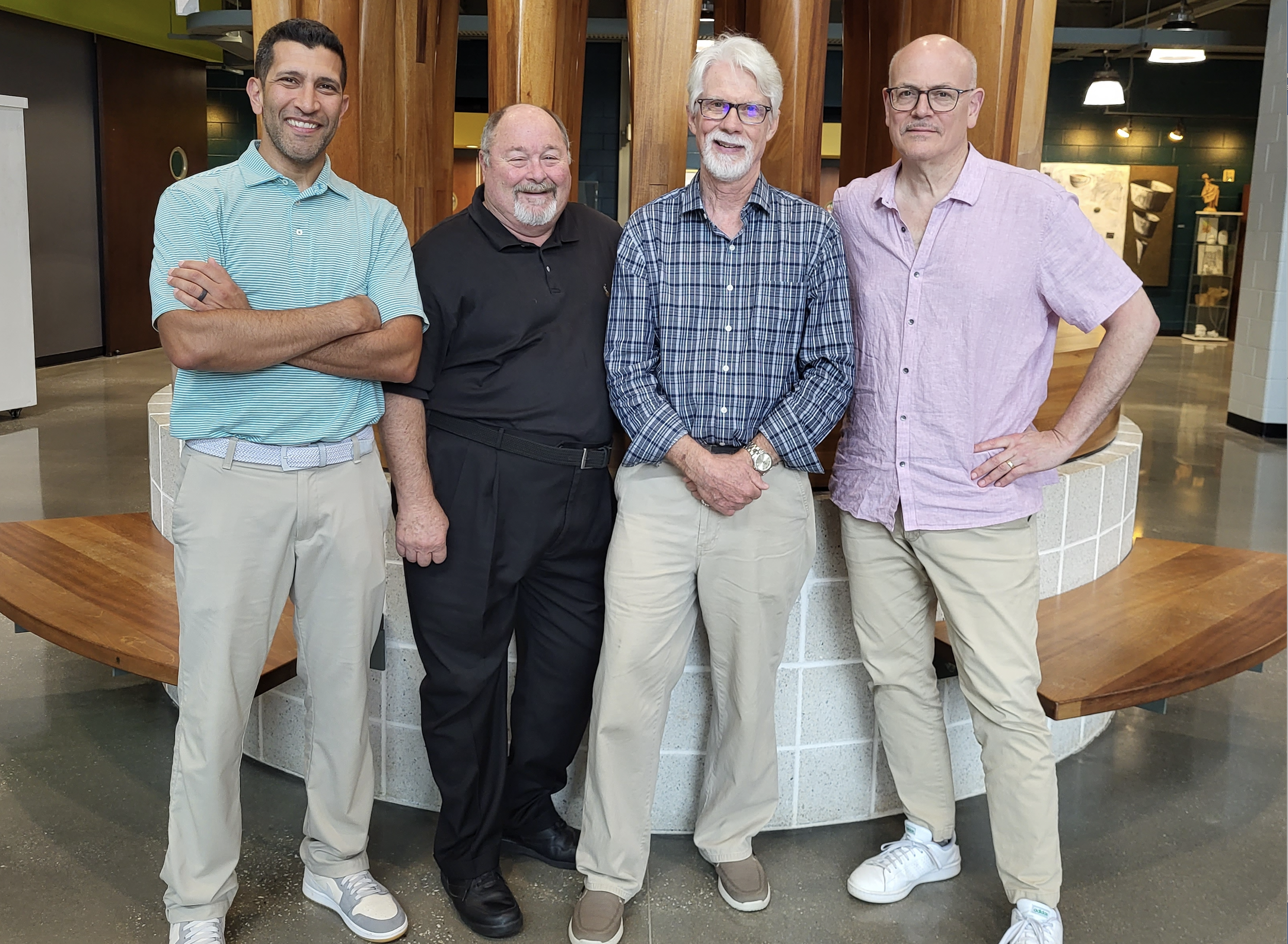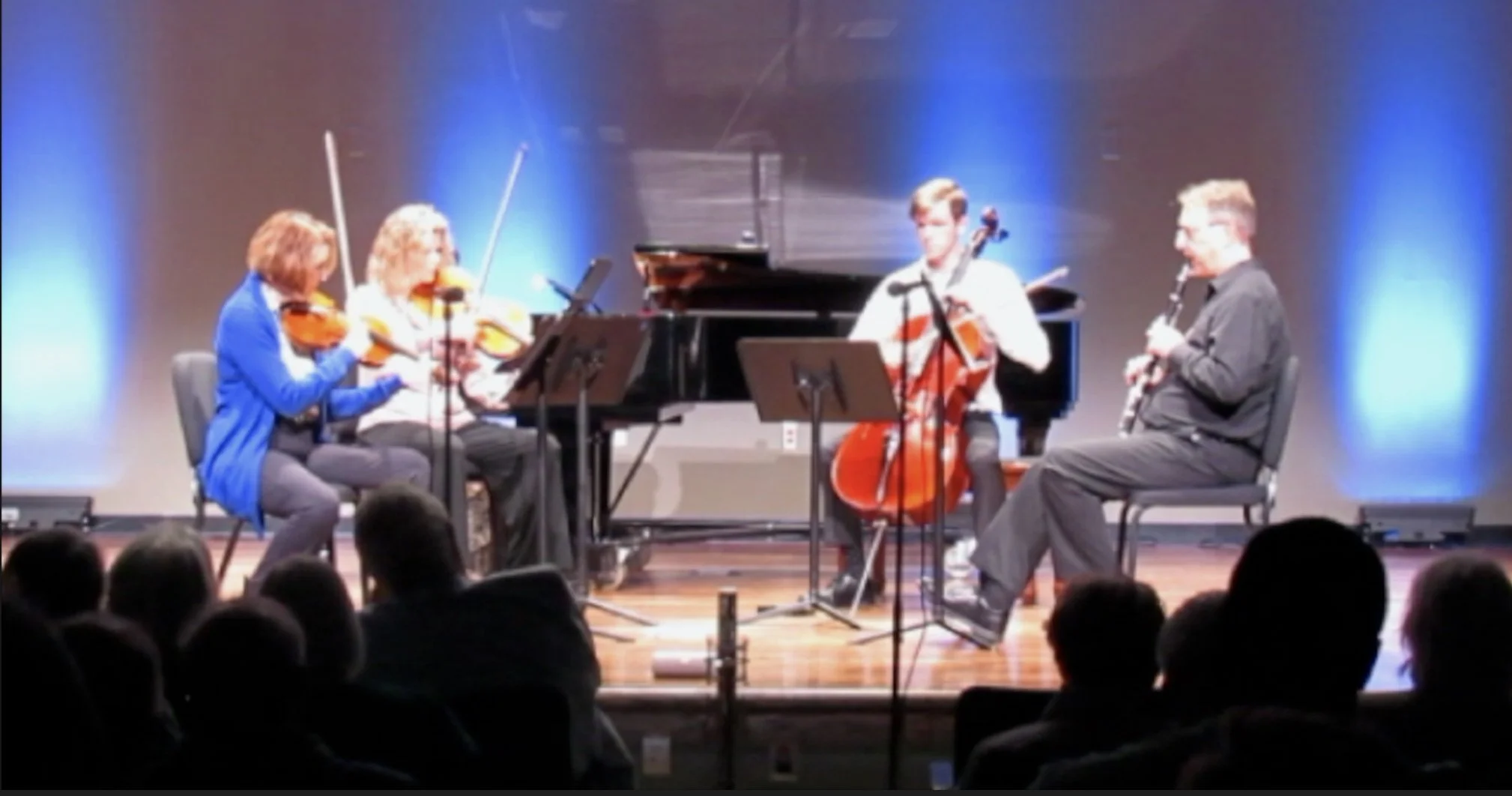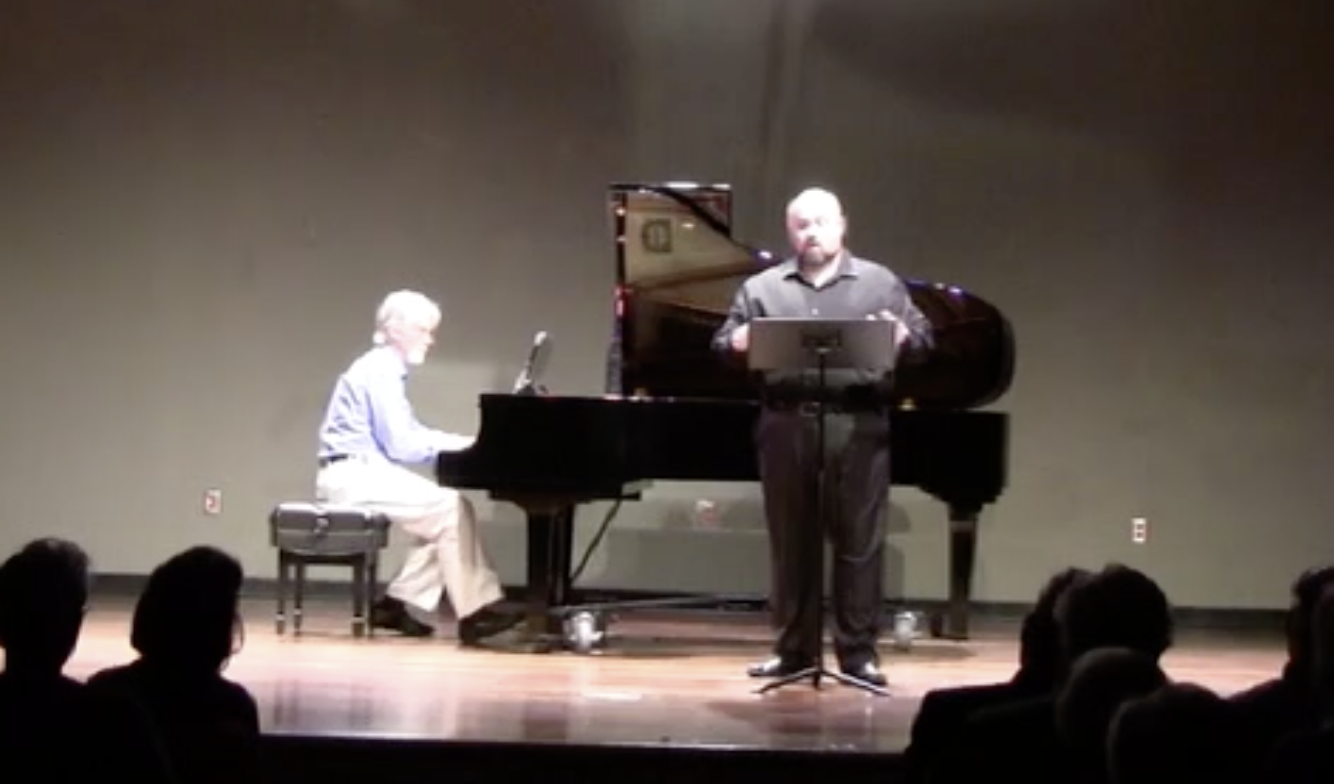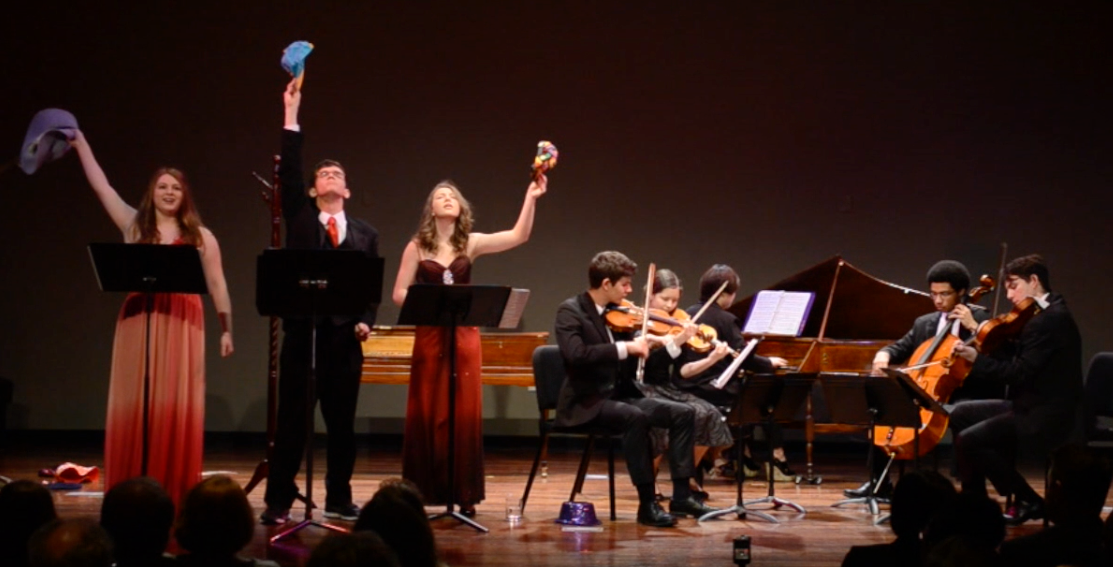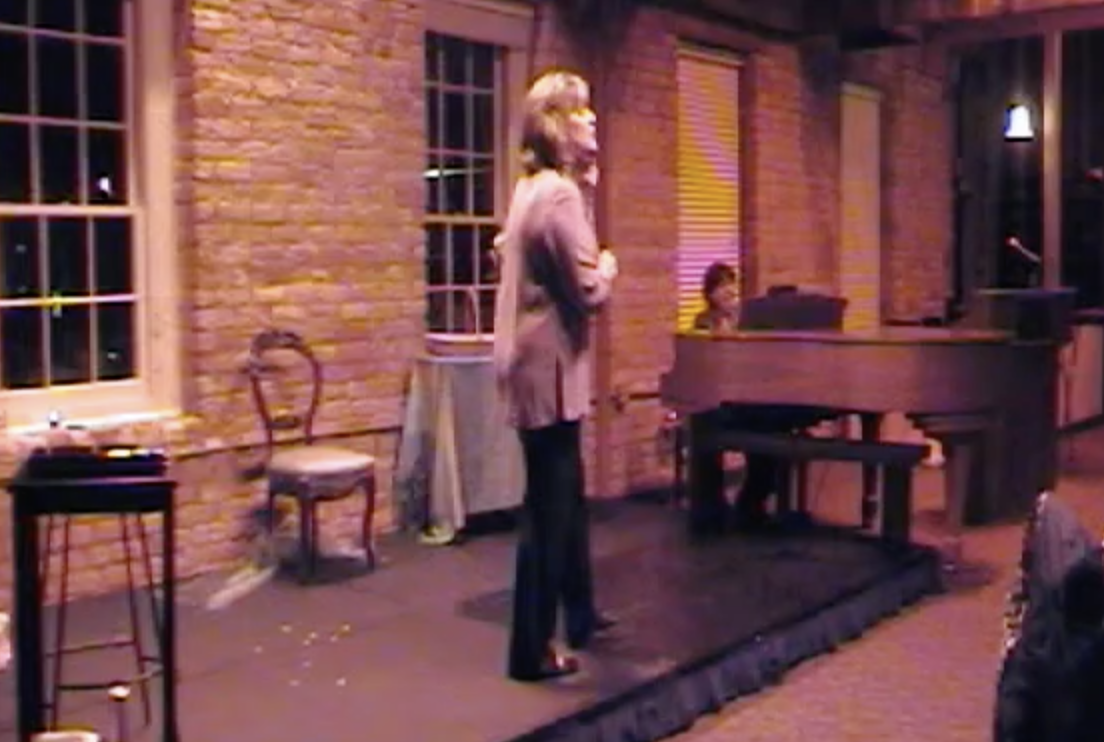performance videos
Trust Me
for Tenor, Violin, ‘Cello, and Percussion
4 February 2024, Virginia Tech University
Text by Keller Cushing Freeman
October Sky - Brian Thorsett, tenor; John Irrera, violin; Alan Weinstein, ‘cello; Annie Stevens, percussion
Trust Me was commissioned by Virginia Tech’s resident chamber ensemble October Sky in 2023 and this is the premiere performance. What a joy it was to work with these world-class players and hear them bring my ideas into being! My most sincere thanks to Annie, Brian, John, and Alan for all the devotion and artistry they brought to the performance. And of course, major thanks are due as well to my intrepid and ever-willing librettist Keller Freeman, without whom this project would never have taken flight at all, let alone assumed its final character.
Trust Me is more or less a chamber cantata, a compact operatic form with one character and a small group of accompanying instruments. A number of recurring motives can be heard, including the opening 2-note heartbeat gesture that also echoes the protagonist’s obsessive insistence: trust me. It consists of two main parts which divide into a number of shorter sections, all performed without break. It is recommended that you follow the libretto, here.
This is material that I feel strongly about. Very strongly. We live in a perilous time when political figures with authoritarian tendencies and messianic complexes sow fear, disinformation, and simplistic solutions to difficult problems in their bid to take power and impose radical, anti-democratic changes upon society. Though we may tend to focus on such people closer to home, such designs are also succeeding in several corners of the world that have been traditionally democratic or were evolving toward democracy. Their seductive promise of restored order and vengeful justice too often falls on the receptive ears of those who feel left out or unfairly treated. Keller Freeman’s 1st-person libretto spells out clearly the alternate universe and tactics common to these wannabe dictators. It is a frightening scenario that has already played out in several countries, and it is a warning to us all not to be complacent. Among the most important responsibilities of art is to hold a mirror up to society and call out such perversities before catastrophic damage is done. Thus, this composition.
States of Play,
for Saxophone Quartet
19 October 2023,
Sigal Music Museum
The absolutely splendid premiere performance of these 8 short movements for sax quartet. Each one offers a musical rendering of a common cliché describing a condition: I. In the Groove, II. In the Weeds, III. In a Funk, IV. In a Tizzy, V. In the Zone, VI. In a Huff, VII. In a Mellow Tone, and (attacca) VIII. In High Cotton. There are a number of influences from musics that saxophones commonly inhabit - funk (I.), blues (III.), bebop (IV.), and latin jazz (VIII.). Mvt. VII. works its way into a quotation of the famous Ellington tune, and proceeds directly into “In High Cotton,” a reference to Duke’s long and important residence at the Cotton Club.
My sincere thanks to the players who put in the enormous effort to bring this to the stage: Cliff Leaman, soprano; Sheldon Johnson, alto; Andrew Allen, tenor; and Joseph Lyons, baritone sax.
Step It Up, for ‘Cello Quartet and Pre-recorded Sounds
15 September 2023, Furman University
This is a performance of Step It Up, performed as part of the faculty recital on the first evening of the Furman University Cellobration, a weekend camp for young 'cellists. The faculty performers are Khari Joyner, Seth Russell, Robert O'Brian, and Christopher Hutton (who organized and hosted the event). Actually designed for younger players, the recorded soundtrack plays a constant quarter-note cowbell which serves as a metronome.
Edgewise live at the
Sigal Music Museum,
29 June 2023
Vee Popat, saxes; Jon Grier, keyboards;
Ian Bracchitta, bass; Duane Malphrus, drums
Finally, after a years-long hiatus exacerbated by real-world responsibilities, Covid-19, and various other calamities, we’ve got Edgewise up and running again. There are several new and challenging arrangements in the book, as well some seasoned ones. Here is a sampling of three tunes from our debut performance at the Museum. It’s good to be back in the saddle! Big thanks to the Sigal Music Museum for having us play.
Watch the videos:
Overcoming, for Violin Viola, ‘Cello, Clarinet, and Piano, 7 May 2023
John Sadak, clarinet; Mary Lee Kinosian, violin; Kathryn Dey, viola; Seth Russell, ‘cello; Lisa Kiser, piano
This is my programmatic fantasy on We Shall Overcome, composed and premiered by students of the Fine Arts Center in Spring of 2009 in honor of the inauguration of our nation’s first President of color. This version replaces on the original violin parts with clarinet. It was included on a concert of chamber music performed by members of the Greenville Symphony Orchestra. Titled “Courage,” this concert was the third of a season-long series featuring GSO performers called Artists Up Close. Complete program notes are here.
Fiddlins’, Sonata for Piano on Appalachian Fiddle Tunes
25 February 2023
Dr. Dale Tsang, piano
A 5-mvt sonata - I. Lil' Sally Goodin', II. Ev'ry Night When the Sun Goes Down, III. Cluck Old Hen, IV. The Nightingale, V. Old Joe & Lil' Liza
Masterfully performed by Dr. Dale Tsang, piano, on a concert of new music for piano sponsored by San Francisco-based Ensemble for These Times.
Complete program notes are here.
A Concert of Premieres at the Acadia Meeting House
13 November 2022
A concert of (almost) all new pieces at the Meeting House of the Acadia Community in Piedmont, SC. Performers include soprano Danielle Knox, tenor Grant Knox, saxophonist Connie Frigo, and the Carolina Brass Quintet. All song texts are by Keller Cushing Freeman. Premieres of Hefty Trifles, for brass quintet, Walking Kiawah, for soprano & piano, and Whatever Was, for tenor and brass quintet. Also performances of Learning to Lose and my arrangement of Shenandoah for alto sax and piano. Program, texts, and details here.
Wide Open, for Orchestra and Narrator - The Young Artists Orchestra of the Greenville County Youth Orchestras
7 May 2022, Gunter Theater, The Peace Center
These four short movements derive the majority of their melodic material from the opening gesture in the strings and from the related down-up-down-up flute motive that follows soon after. The movements follow the familiar slow intro/fast – slow – scherzo – fast finale sequence and are played without interruption. The readings are a series of exhortations to be a good citizen of planet Earth.
Introduction/Open Your Eyes - The opening introduces most of the melodic material that will be important in the rest of the piece. This brief placid section might suggest the sleepiness from which we about to awake. It is followed by more exotic, turbulent music reflecting the surprise – perhaps not all of it pleasant – that is revealed by truly opening one’s eyes. An ongoing, driving bass pattern suggests that the journey may be long and challenging.
II. Open the Window - Largely serene, quiet, and colorful in celebration of the natural world, with evocations of crickets, birdsong, and warm breezes. There is also a sense of one’s smallness compared to it all, especially in the lyrical, solitary string lines. The movement ends on a cautionary note.
III. Open the Door - Steady, motoric, light, with a trio section that is more lyrical and moody. The relentless, forward-leaning rhythm suggests urgency and determination; the syncopation suggests the challenge in maintaining one’s balance and perspective in this personal project for which there are few instructions. Moods of both joy and apprehension are experienced along the way.
IV. Open Your Heart/An Invitation - Unabashedly dramatic music brings us to the crux of the matter: changing our hearts. References to the previous movements remind us how far we have come and how the project is never really finished. A concluding challenge is issued in the Invitation, couched quietly in music from the Introduction, its persuasion enhanced by understatement.
Preston Spivak, percussion; Vee Popat, Narrator; Gary Robinson, conductor.
Texts by Keller Cushing Freeman.
Aesop’s Asses premiere, 20 January 2021
Patricia Raun, narrator, and Alan Weinstein, ‘cello.
ass – n[from Latin asinus] 1 : any of several hardy gregarious mammals (genus Equus) that are smaller than the horse, have long ears, and include one domesticated form (E. asinus) used as a beast of burden 2 : a stupid, obstinate, or perverse person (Webster)
Aesop (ca. 620-564 BCE, Greece) - a Greek fabulist and storyteller credited with a number of fables now collectively known as Aesop's Fables. Although his existence remains unclear and no writings by him survive, numerous tales credited to him were gathered across the centuries and in many languages in a storytelling tradition that continues to this day. Many of the tales are characterized by animals and inanimate objects that speak, solve problems, and generally have human characteristics. (Wikipedia)
The husband & wife team of Alan & Patty do an absolutely wonderful job of the premiere of these 6 short fables - animated and entertaining.
Present Affections premiere, 20 April 2020
Zoe Kushubar, violin, and Brennan Szafron, piano.
I am extremely grateful to Zoe and Brennan - two deeply talented musicians who undertook the performance of my long and challenging violin sonata, Present Affections on 23 April 2020. Zoe gave this performance as part of her senior recital at Converse College and is on her way to graduate studies at Florida State and Brennan is Professor of Piano and Organ at Converse College. I urge everyone to keep and eye and ear on these two fine performers.
You can read detailed program notes here; check out the score here.
Sigal Music Museum concert, 6 March 2020
Danielle McCormick Knox, soprano, and the composer at the piano.
This was a wonderful evening that we were fortunate to perform just before the Covid-19 lockdown. Danielle is a marvellous singer, interpreter and colleague. Hear for yourself! This is the first half of the concert which was dedicated to songs of my own. You can view the evening’s printed program here. You can follow song texts here; check out the scores here.
The 2nd half the concert was my arrangements of 10 Stephen Foster songs. I played the accompaniments on the SMM’s 1834 Nunns & Clark square piano, an instrument that Foster may well have known, for a more authentic 19th-century listening experience. Check out the scores here.
A Wisdom Sung, 22 May 2019
Students of the FAC Voice III & IV classes, Danielle McCormick Knox, instructor.
This is the alma mater I wrote for the FAC, premiered on my last FAC Graduation in May of 2019. The text echoes with sentiments that I heard from Dr. Roy Fluhrer over the 28 years that he led the school: make the most of your talent, don’t be afraid to fail,live your art. That culture still animates the FAC under the leadership of Vee Popat. You can learn more here. Download the free score here.
Pine Knoll Blues premiere, 14 May 2019
Josh Liu and Anya Gerber, violins; Nick England, viola; and Emily Pilgrim, ‘cello.
With this work I bid my fond farewell to the Strings Chamber Music program at the Greenville Fine Arts Center upon my retirement from the FAC in the spring of 2019. It was a great joy in my career to work with the talented students in this program – teaching them theory and history, as well as composing for them – and collaborating with their enormously gifted instructor, John Ravnan. I could scarcely have been more fortunate.
The music opens with a symbolic motto: the first three pitches – F-A-C# – are transposed three times, thereby including all 12 chromatic pitches; it is rendered in 31 notes for my 31 years at the FAC. Later it is repeated verbatim, or, in 25 notes to represent John’s 25 years at the FAC, as he also retired that spring. At bar 139 there is a brief, possibly humorous quotation of Happy Trails. Other than these items, it’s a 12-bar blues, with a fair amount of motivic consistency in melodic elements. Check out the score here.
A Welcome to the World premiere, 4 March 2019
Cantus - students of SCGSAH, Dr. David Rhyne, director
This was commissioned by Dr. David Rhyne, director of Cantus, the elite chamber choir at the South Carolina Governor's School for the Arts and Humanities. Keller Freeman's text focuses on the essential truth that we truly are a nation of immigrants. It mentions, by name, a large number of immigrants - male and female - that have made significant contributions to the American story. It's a celebration of the tremendous strength that is the result of this mixture of peoples. Check out the score here.
Migrant from Message of the Migrant, a concert to benefit Upstate Forever, 21 February 2016, 21 February 2016
John Ravnan, viola, Kristen Ironside, piano.
These movements are loosely based upon the life cycle of the North American Monarch butterfly (Danaus plexippus). Once common throughout the US, its populations are in serious distress owing to a variety of pressures from humans. Populations of the Monarch east of the Rocky Mountains are estimated to have declined 90% in the period of 1994-2014. Each of the movements ponders one of the four stages of the Monarch life cycle. You can read detailed program notes here; check out the score here.
I. Oviposition II. Instars III. Chrysalis IV. King Billy
Imperiled Blaze, from Message of the Migrant, a concert to benefit Upstate Forever, 21 February 2016
Christian Elser, baritone, and the composer at the piano.
These five songs were written for this concert to Benefit the Upstate South Carolina environmental preservation group Upstate Forever, each using texts written for the occasion by poets of the Emrys Foundation (Keller Cushing Freeman, Jan Bailey, Marian Willard Blackwell, Sue Lile Inman, and Nancy Dew Taylor). All of the poems refer somehow to the Monarch butterfly, but use this as a way to address other issues. You can read detailed program notes here, and the poems here; check out the score here.
Shenandoah, from Message of the Migrant, a concert to benefit Upstate Forever, 21 February 2016
Connie Frigo, alto saxophone, and the arranger at the piano.
This lovely, sorrowful, and well-known sea shanty was a favorite of my mother's, and this is a transcription of a piano solo arrangement I did for her memorial service in 1997. Connie is a beautiful person and sax player. Check out the score here.
Triple Dances, for Trio d’Anches (Oboe, Clarinet, & Bassoon) at Lynn Conservatory, April 2015
Nora Lewis, oboe; Phillip O. Paglialonga, clarinet; Eric Van der Veer Varner, bassoon
Originally scored for clarinet, alto sax, and bassoon, I transcribed these three short stylized dances (Minuet & Duos, Sarabande After Handel, and A Freakin’ Gigue) for the wonderful PEN Trio in 2014; they gave the premiere in a residency at the Fine Arts Center that same year. This is a wonderful group of musicians and great fun to work with. I am deeply saddened by the untimely death of bassoonist Eric Varner while on tour with the Trio in October of 2019. Check out the score here.
The Trouble with the Text, FAC, 27 March 2015
Naomi Henn, soprano
Alexandra Gravina, mezzo-soprano
Taylor Lomax, baritone
Marc Pitois and Sarah Davis, violins
Jotham Rosen, viola
Michael Hartman, ‘cello
Yu Jung Jeon; harpsichord
This is my comic cantata on an amusing prose poem by my friend Claire Bateman, in which 24 students in a creative writing class make various excuses – all of them lame – for why they didn’t do the assigned reading… hence the 24 different hats. It’s an acute study in verbose teenage rationalization. More or less following the conventions of an early 18th-century chamber cantata, the music resembles the style of George Frideric Handel - on a bad day. Special Thanks to Dr. Tom Strange for the loan of the 1748 Kirkman spinet harpsichord for the basso continuo. Check out the score here.
I. Overture II. Recitative: The Pages Kept Changing Places
III. Aria: The Book Was Too Faddish
IV. Recitative: The Key Didn’t Fit the Lock
V. Ground Bass: The Spine Had Been Punctured
VI. Chorus: Esperanto
VII. Recitative: The Book Was So Heavy
VIII. Aria: The Book Was So Light
IX. Arioso: The Book Was Too Amnesiac
X. Chorus: Nothing More To Be Said!
Pisgah Songs, Southeastern Composers League Forum, Converse College, 27 February 2015
Laura Thomason, soprano; David Kiser, piano
Laura Thomason and David Kiser gave this performance as part of the 2015 Southeastern Composers League Annual Forum at Converse College. Pisgah Songs were first performed as part of the 2014 Upcountry Muse, a concert of chamber music premieres to benefit the conservation organization Upstate Forever. The texts are by prominent members of the Upstate writers’ support organization, the Emrys Foundation. Check out the scores here.
Nocturne, for ‘Cello and Piano, premiere from Upcountry Muse, a concert to benefit Upstate Forever, 24 April 2014
Alan Weinstein, ‘cello; Elizabeth Bachelder, piano
This work begins with the setting of the sun and then seeks to describe three nocturnal creatures that are nocturnal and largely unnoticed by the general public; they are nonetheless in decline owing in whole or part to human influences. This relatively unseen world harbors many mysteries, fascinations and beauties, and its health has everything to do with the health of the daytime world we inhabit. To appreciate these things is the essential first step to cherishing them. The sequence of movements tells an overnight story - after Dusk, there is “Pipistrelle,” any of a number of small bats in the genus Pipistrellus; “Nightjar,” any of a number of swift, medium sized, night flying, insect eating birds of the family Caprimulgidae, including the Common Nighthawk (Chordeiles minor); and “Hellbender,” a rare giant salamander of the Appalachian region. The suite concludes with Dawn, using material similar to Dusk. Check out the score here.
Eurotänze partial premiere, MIT, 25 July 2013
Members of the Atlantic and Triton Brass quintets - The Tritantic Brass.
This performance, by the combined members of the Triton Brass Quintet and Atlantic Brass Quintet, took place in Killian Hall at the Massachusetts Institute of Technology in the summer of 2013 as part of a concert series called Sundays at 3. They did a wonderful job, playing 4 of the 6 movements - I. Prelude, III. Habanera, IV. Reel/Habanera reprise, and VI. Tarantella - on two rehearsals. This suite of stylized dances is modeled on dance suites of the Baroque era, with each dance representing a different European country, though these were not dances typically included in a Baroque suite. Program notes are here; check out the score here.
Big Snit Boogie premiere, FAC, 3 May 2012
Maria Parrini and Naomi Causby, piano
This was composed for two wonderful student pianists at the Fine Arts Center in 2012, Naomi Causby and Maria Parrini. This performance in Recital Hall gave them the chance to utilize some of their well-polished classroom antics as well as their terrific musicianship. Check out the score here.
Museum Pieces, FAC, 2 May 2012
Mary Stuckey Freeman, soprano; Connie Frigo, saxophone; Reagan Bachour and Paul Aguilar, violins; Shannon Elliott, viola; Maria Parrini, violoncello
These songs were commissioned to celebrate the 30th anniversary of the Emrys Foundation, a writers’ support group launched in 1982 in Greenville, South Carolina. Helen Dupré Moseley (1887-1984) had been many things in life, when — without training of any sort — she took up painting in 1947 at the age of 60. In the words of Tom Styron, Director of the Greenville County Museum of Art, “...Moseley realized her particular genius by distilling essential truths from childlike dreams.” In the summer of 2012, 16 Emrys poets were invited to compose brief poems on selected works of Moseley’s from the GCMA collection. I set 6 of these poems to make this little suite of songs. As the paintings in question are untitled, the song titles are my own, derived from the poetry. Be sure to check out the detailed notes under the YouTube video. Check out the score here.
I. No Point to Miss II. Mrs. Snoot's Composure III. Magic Serpent
IV. Quiver & Cringe V. Who Did This to My Hair??? VI. Where the Wondering Grows
Take Me Out to the Ball Game premiere, FAC, May 2011
Reagan Bachour, Jordan Goodwin, Joshua Goodwin, and Joshua Anderson, violins
I was once asked by a friend for an amusing piece for 4 violas (or violins), and this was it. I received a commission of 7¢ and I probably over-charged. Here it is rendered (rended???) by 4 FAC students in May of 2011. Their instructor, John Ravnan, is an enormous baseball fan, and it definitely shows. Check out the score here.
Lecture/demo & performance: Dimitri Shostakovich String Quartet #8, in C minor, op.110, FAC Recital Hall, May 2010
The Athena Quartet: Beth Uhimchuk and Sarah Leonard, violins; Melissa Gaddy, ‘cello; Anna Catherine Bowden, viola
In March of 2010 the Athena Quartet - a student string quartet from the Greenville Fine Arts Center - staged a performance of the complete Shostakovich String Quartet #8 in C minor. An exploration of the background and possible programmatic content of the work was developed, with excerpts illustrating the various points performed by the quartet. This was presented as a prelude to the complete performance. This was a remarkable group of high school seniors - very rewarding to work with.
You can view the handout that was distributed to the audience here.
Voices from the Village - transcription for Piano Trio at the Southeastern Composers’ League Annual Forum, 17 April 2017
Arianna Wyatt, soprano, with the Kandinsky Trio - Benedict Goodfriend, violin, Alan Weinstein, ‘cello; Elizabeth bachelder, piano.
The same songs as the set below, with strings added. Watch for a great moment by Arianna at the beginning of “Redhead, Petite and Beautiful.”
Voices from the Village, at EMRYS 25th Anniversary Celebration 11 November 2008
Mimi Wyche, singer/actress; Vivian Hamilton, piano.
This is my song cycle taking texts from female-seeking-male personal ads from the New York Times and the Village Voice; the titles and the words are taken verbatim from the ads. This performance took place at the 25th Anniversary celebration of the Emrys Foundation. The actress is Greenville native Mimi Wyche and the pianist is Furman staff member Vivian Hamilton. Monica Bell, from the Theater faculty of Coastal Carolina (and FAC Theater instructor in the early 2000's), was the director. Mimi is fabulous! This is a low-quality recording, but a masterful performance. Check out the scores here. The songs:
I. Adorable Cutie with Brain II. Fantasy Dancer III. Elegance Seeks Upscale Quality IV. Redhead, Petite & Beautiful
V. Endangered Species VI. Please Have All Your Marbles VII. Starlight Princess






